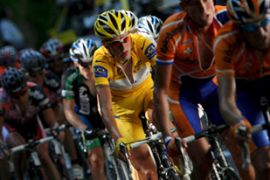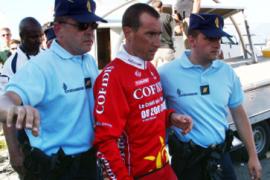Tour leader Rasmussen expelled
Sacking for missing drugs test leaves cycling’s Tour de France in disarray.

Bergsma said the expulsion was ordered by the Dutch team sponsor.
His expulsion follows the withdrawal from cycling’s premier event of one of the pre-race favourites Alexandre Vinokourov of Kazakhstan and his Astana team on Tuesday.
Vinokourov, winner of two stages in three days earlier in the Tour, failed a blood doping test after his victory in Saturday’s stage.
Jeers
| Fallen heroes | ||
Floyd Landis: Winner of the Tour de France in 2006. A victory that is not recognised by the race organisers following his positive drug test. Landis denies taking testosterone and is still hoping to overturn a US anti-doping agency ruling. Jan Ulrich: The now-retired 1997 tour winner was forced out on the eve of last year’s race after being implicated in Operation Puerto, a large Spanish investigation into a blood-doping scandal at a Madrid clinic that implicated more than 50 riders. He denies any wrongdoing. Ivan Basso: Tour runner-up in 2005 he was also kicked out of last year’s race. The Italian accepted a two-year doping penalty from his federation and says he “attempted” doping, but never went through with it. Bjarne Riis: Became a national hero when he became the first Dane to win the tour in 1996. Confessed earlier in the year that he had used drugs to win that race. Now a team manager, he declined to attend this year’s Tour. Richard Virenque: A seven-time winner of the King of the Mountains jersey. He was part of the Festina team kicked off the race in 1998 after police found doping material in a team car. It became known as the Tour of Shame. |
Rasmussen faced jeers from the crowd at the start of Wednesday’s stage for missing the pre-Tour doping tests.
The 33-year-old Danish rider had looked set to win the event which ends on Sunday in Paris, but race directors repeatedly said he never should have been allowed to start.
Christian Prudhomme, the Tour’s director, said: “We cannot say that Rasmussen cheated, but his flippancy and his lies on his whereabouts had become unbearable.”
Pat McQuaid, the head of cycling’s governing body, applauded the decision.
“I can only applaud that. It’s a zero-tolerance policy and it’s a lesson for the future.”
But he added: “Why didn’t they do this at the end of June, when they had the same information?”
With Rasmussen out, Spanish rider Alberto Contador of the Discovery Channel moves into the lead at this year’s tumultuous event.
Failed tests
On Wednesday, Codifis rider Cristian Moreni was taken away by police at the end of the 16th stage after failing a test for testosterone.
Eric Boyer, the Codifis team manager, said: “He accepted his wrongdoing and did not ask for a B-sample.”
Codifis, France’s top cycling team, are to leave the Tour following confirmation of the results, Tour organisers said, becoming the second team to leave in 24 hours.
Moreni tested positive for the hormone following the 11th stage of the Tour de France on Thursday – the third competitor to fail a dope test.
The Italian had started the 16th stage in 58th place overall and placed 41st in the stage.
On Tuesday, Astana team leader Alexander Vinokourov failed a test for blood doping.
The Kazakh had won two stages in this year’s race and in the fallout of his failed test his entire team withdrew from the race.
The race was already reeling from the withdrawal of T-Mobile rider Patrik Sinkewitz after he failed a pre-Tour drugs test with high levels of testosterone.
 |
| Italy’s Cristian Moreni was arrested after the 16th stage [AFP] |
That case saw German TV stations ZDF and ARD immediately suspend their coverage.
A number of major sponsors including T-Mobile, Milram and a Swiss bicycle manufacturer are now reconsidering their future association with the Tour.
The UCI, the international body which controls cycling, was confident of a drug-free Tour after all riders in this year’s race signed an agreement in which they would forfeit a year’s salary as well as receive the mandatory two-year ban if they were found guilty of doping.
Explosions
Earlier, two small explosive devices went off along the route of the Tour in northern Spain.
Blasts came after riders had already passed through the Navarra region near the border with France.
A person claiming to represent Eta, the Basque separatist group, had made a bomb threat by telephone, Spanish media reported.
